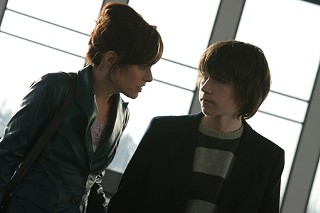We Have Met the Future, and It Is Us
Film on the Web, Part II: The movies
By Spencer Parsons, Fri., March 9, 2007
Jean-Luc Godard: [I]n the movies it is different. You can be with other people, which is ideal, or you can be alone. But to be alone with other people, and not to forget yourself within yourself. And when there's 100 people around you can't really forget yourself. Now, this will disappear, obviously.
– "In Images We Trust: Hal Hartley Interviews Jean-Luc Godard," Filmmaker, Fall 1994
It was over breakfast tacos at Red River Cafe three years ago that Scott Wilcox first told me about watching movies on cell phones. I'm sure of it, because I remember nearly snorting up my coffee at the thought, which struck me as funny and frightening. Then I also remember him saying, "Dude, seriously. You should think about how to make movies for phones."
We'll have to trust my memory on that one, because it wasn't an interview. One really shouldn't keep notes on brunch with a college buddy. But this time I'm typing like mad while we talk. Wilcox is chief technical officer for South by Southwest, which this year is making trailers for its films available in three different file formats viewable on cell phones.
"We're really at the beginning of people watching things on their mobile devices," he tells me today. "So for these everything-in-one mobile browsers, we've got news, schedules, audio, and video. It's basically designed so you can check out schedules and trailers on your phone while you're waiting in line to see a film."
So it's really here. No, I don't just mean movies on phones. We've speculated endlessly through think pieces and panel discussions, been through Internet booms and busts and torrential downpours of hype, and now it's been around just long enough for Time's coronation of "YOU" as person of the year to make Internet filmmaking and filmmaker networking so five minutes ago.
Of course, video on the Web has actually been around a while; Wilcox had SXSW putting up trailers in 2000, and on another site, he posted in its entirety a short film we made together in the same year. The difference isn't just that back then there were only four trailers, and as of this writing, the SXSW Web site hosts 130; the difference is that now most people can actually see them ... and more importantly, that dorks like me don't need someone as tech-savvy as Wilcox to post our movies to the Web for us anymore.
So, now, my e-mail inbox brings me more exciting links to crazy shit than I can keep up with, and I've stopped treating that MySpace page as a joke. More significantly, I've started to see changes in the lives of my friends and colleagues. For any filmmaker now, it has to be a time that involves a lot of questioning. What can I do with these new opportunities, and what are the effects on feature filmmaking, the relatively old medium I've chosen? What are the politics and poetics of YouTube, and should I drop everything to make movies for phones?
"I feel like the mushroom cloud of the Internet hasn't even disappeared yet, and we're still in the blast of ground zero of that, and who knows what kind of mutations we'll all have before we can see it for what it is." Brad Neely is the first one I decide to bug about all this. His alternate soundtrack to the first Harry Potter film, Wizard People, Dear Reader, brought him early recognition, and at 21/2 hours, might have the longest running time of any viral success on the Internet. Plus, he lives in Austin, and I haven't seen him in a while, so an interview is a good excuse to grab some beer.
His fiendishly catchy "Washington" (SXSW Film 06) garnered more than 2 million views on YouTube, laying down rhymes about a founding father who allegedly ate opponent's brains and invented cocaine (he's coming, he's coming, he's coming). This led to a paying gig making shorts for Turner Entertainment's SuperDeluxe.com that allowed him to get out from behind a cash register. Oddly enough, "Washington" was a result of trying to make a ringtone.
"At the time, there was this frog sound that was making a lot of money as a ringtone ... and this guy, he calls and says, 'Hey, I've seen your comics, and they're really funny; do you think you can do a song as a ringtone?' I thought maybe I could make some money and have more time to finish this book I've been working on and do my day job a little less. I made it in about a week, and he got back to me, said, 'Hey, this is really funny, but why don't you do one about Snoop Dogg or Jessica Simpson instead?' After I sat on it a little bit, I made a bunch of copies, like I always have with my comics. I don't really know influential people, but I know people who have a lot of friends, and they like passing stuff along. Talking about it now, I realize it's pretty in keeping with my usual m.o."
This might account in part for why it was so successful once he posted it on YouTube. What works best is what people most want to pass along to friends. "I didn't really know what it was. I didn't realize it was this résumé pool. ... What's fun about it is that [when they hired me] the people from Turner only knew me through 'Washington.' And at that point, Wizard People was the big one with lots of press.
"There are types of things that will work for this viral, online, short-form content and things that won't, because format dictates everything. I'm lucky, because I have an interest in a kind of content that works for the Internet, and that interest is my motivation. I think it comes from songwriting, the short form. I have an interest in larger-form things, like features and novels. But if I only had a real interest in those larger things, I wouldn't do this. I think it's really dangerous to view the Internet as the minor leagues of Hollywood."
The minor leagues of Hollywood. That would be Indiewood, right? That's just one of the more recent "new waves," and certainly over the past two decades, the indie scene has produced many directors, some quite independent-minded, that did join Hollywood's major league, while others like Hal Hartley remained committed to their own rules and chose not to play ball. Following the success of his first feature, he begged off an opportunity to direct Pauly Shore in Encino Man by claiming he might be terminally ill and ever since has pursued artistic autonomy by adjusting his means and methods to fit the changing financial and technological realities of the business. Back in 1994 (before a lot of people had e-mail and as the Web was just beginning to take shape), he discussed Internet distribution of films with a highly skeptical Jean-Luc Godard in Filmmaker, and many of Hartley's films since then have probed or satirized our changing technological landscape.
His Fay Grim continues the story of Henry Fool, in which a garbage man posts on the Internet an epic-length poem that goes on to be a viral sensation, eventually winning a Nobel Prize. The newer film similarly concerns a dangerously unstable text that has been encoded and translated through so many permutations that the classified information it supposedly holds about terrorism and national security may ultimately refer to nothing at all while bringing some readers remarkably close to building nuclear weapons. Clearly, his forward-thinking optimism has been balanced by a healthy skepticism about media. How much poetry, after all, are we likely to find on the Web?
"Most of it seems like jokes," Hartley says via e-mail. "Sketch comedy. Which could, of course, at this time be its real value. Satire is important. But my general impression is that I don't see great work coming from these new avenues – what I do see is great intelligence and energy (among truly breathtaking stupidity) that wants to find projects and opportunity worthy of itself. And, of course, the documentary footage one sometimes sees on YouTube or something similar is a great resource and a much-appreciated nuisance to the mainstream media.
"Making motion pictures is a very common thing to do now, in the sense that the tools needed to make motion pictures are not expensive or unusual for people to possess. ... So, maybe, it is finally becoming like what the French New Wave guys (at 28 or 29) liked to describe as camera stylo – the camera pen – that the motion-picture camera could be as personal a means of expression as a pen or pencil.
"Now, of course, the pencil has been a handy tool of creative potential for centuries. But popular expectations of 'art,' 'philosophy,' or 'criticism' tend to convince most people that their own efforts to write something meaningful with that pencil would be absurd unless ... what? They were better educated? Smarter? More experienced? Better looking? On the other hand, a lot of people don't have anything to say. ... But in the beginning, as in the end, it's about the constant push and pull between an individual's interests and concerns and those of the population at any given time: having the energy and endurance to say what you have to say and engage with the audience who may or may not like what you are saying ... whether you're writing with a pencil or with Final Cut Pro, that's never changed."
By now, it's hard to find anyone who speaks with unalloyed optimism about YouTube and its promise of democratizing media. The low quality of a lot of the work can be encouraging – one thinks, I can do better than that! – but it can also be dispiriting. They say that the price of liberty is eternal vigilance, but spend an afternoon wading through the morass, and the price of vigilance can seriously decrease one's patience and rub the shine off of even the genuine oddities and wonders. We can post anything we want, but a lot of what we post is clips of corporate media products that don't need the help, hardly a populist challenge to the existing order. And all too often when we make something ourselves, we make craven audition tapes aping the strategies of surprise hits like LonelyGirl15, or worse, we simply choose to remake "Dick in a Box." Per Walt Kelly's Pogo, "We have met the enemy, and he is us."
There would be no story here without examples of much more ambitious work on the Web, made completely independently as well as paid for by corporate gatekeepers of one stripe or another. For instance, aside from a music video about JFK that was obviously made to repeat the success of "Washington," Neely's pieces made under Turner Entertainment's patronage not only betray no hint of working for a paycheck, but some of it might arguably be his strongest material yet. "I Am Baby Cakes: Diary #1" (playing in Texas Shorts 1) begins the saga of a role-playing, freestyling man-child in camouflage cargo pants whose observations of a very strange world capture an emotional range that's highly unusual, if not unique, among Internet comedy shorts.
Or take Joe Swanberg's Young American Bodies, made for Nerve.com, about to enter its second season. While very funny and offering the obvious attraction of sex and nudity that are very much "not safe for work," the series functions more as episodes from a traditional romantic comedy or melodrama than as viral sketch comedy.
"It doesn't have the quality that's easily forwardable," Swanberg says. "I know my work has a limited audience. It's too explicit and too ... something else to have that kind of crossover appeal." That something else might have to do with a maturing narrative style. While certainly deriving from the tone and methods of his previous features, Kissing on the Mouth and LOL (SXSW Film 05 and 06, respectively), Young American Bodies more directly presages the emotional intensity and patience with character of his current Festival effort, Hannah Takes the Stairs.
"As my confidence grows as a filmmaker, I'm more comfortable doing more straight-up comedy or straight-up romance. On the first two, I tended to work from what I knew how to do already or felt more comfortable with and avoid those things. I used a lot of formal strategies as a safety net to keep the audience interested in case the basic stuff wasn't working. But with Young American Bodies, I just said, "I'm gonna try it; just trust character and story."
"It happened out of a fortuitous timing and desire on my part to produce something for the Internet. I've wanted to do an episodic series for some time, and in October 2005 I did an interview with Nerve ... and found out they were looking to branch out into funding original video. The timing worked out perfectly. If it hadn't worked out perfectly, I would have probably moved on to something else. It's not the kind of thing I would have tackled on my own for fun."
If the project made for good creative practice, it also proved a smart business decision. Young American Bodies attracted more than 600,000 views. Even assuming multiple views per person, his limited audience has proven to be fairly large, and he credits the attention the series received to solid sales for the August DVD release of Kissing on the Mouth, which became officially profitable at the end of November.
"You can see how the viewership fluctuates on an episode-by-episode basis," points out Anish Savjani, producer of Swanberg's Hannah Takes the Stairs. "For a producer, in this ultra-low-budget scene, you can start to see the way that you can make a profit. You create the right awareness, and then you can sell it out of the trunk of a car."
Savjani decided to produce a Swanberg feature after seeing LOL at my behest during last year's Festival. I was a fan of Kissing on the Mouth and had been assigned to write a piece on the new film for the Chronicle and liked it so much that I made him go with me to the premiere screening. Little did I realize that one of the producers for my own film would end up producing Swanberg's next movie while we were shooting in Denmark. But given how well Swanberg works a room and what a good place SXSW has been for filmmakers to meet each other and begin working together, it isn't all that surprising. Already in the process of enlisting Andrew Bujalski, Mark Duplass, and Kent Osborne to act in the film, all of whom he had met at SXSW, Swanberg also worked his way into Bryan Poyser's short film "Grammy's" (playing before Ti West's Trigger Man) and made friends with Aaron Katz, who would later cast him for a small role in his feature Quiet City.
Katz admits he's just glad to be able to promote his film by posting a trailer on MySpace, which simply wouldn't have been possible a few years ago.
"You know, for Joe, the Internet is a destination, to get the work out, but for me, it's a tool. It's there to help let people know that the films are out there and showing." This dovetails with something Wilcox mentions, that increasingly artists have the resources to "offer enough that you make people want to see the work but not enough to supplant the experience you're promoting."
And some experiences, while enabled by technology, can't really be supplanted anyway. So, I suspect that while he's no devoted creature of the Internet, Katz nevertheless completes the circuit. "[After SXSW], Joe and I were able to keep in touch. One thing I think the Internet is good for is to share work with people in different places. They don't have to live in the same city to give a good opinion on something. After film school, as everyone really went their separate ways, I didn't really feel so much a part of any community, but at South by Southwest [06] with Dance Party, USA, I got excited, sharing ideas and being excited about other people's movies again."
That sort of community shouldn't only be for filmmakers, and the technology at least has the potential to help bring audiences together, too. Every filmmaker I talked to worried or speculated that our big-screen experience might be changed or compromised by the effects of all the little screens available to us. But then much depends on how we use those little screens to entertain and build and attract our audiences, and it will be our own fault if we fail to consider what the exchange is about when we get people to pick up the phone. ![]()
See "The Future of Film on the Web, Part I: The means."
I Am Baby Cakes: Diary #1 (as part of Texas Shorts)
Monday, March 12, 9:30pm, DobieFriday, March 16, 5pm, Dobie
Saturday, March 17, 2pm, Dobie
Hannah Takes the Stairs
World Premiere
Sunday, March 11, 7:15pm, ParamountDirector Joe Swanberg will be on the Building an Online Fan Base panel on Sunday, March 11, 3:30pm, Austin Convention Center, Room 12AB.
Quiet City
World Premiere
Monday, March 12, 4pm, Alamo South LamarWednesday, March 14, 4pm, Alamo South Lamar
Friday, March 16, 1:30pm, Alamo South Lamar
Fay Grim
Regional Premiere
Friday, March 16, 9:30pm, Alamo South LamarSaturday, March 17, 9:45pm, Alamo South Lamar














